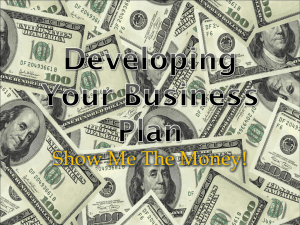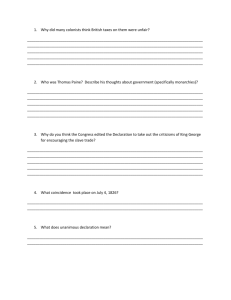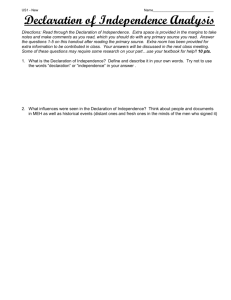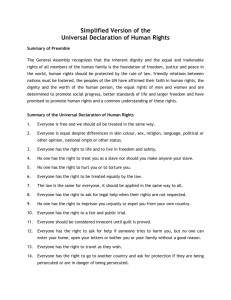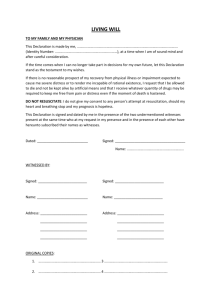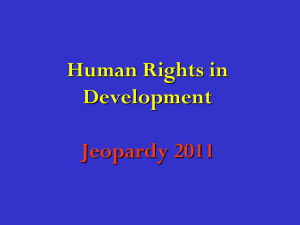How the Complete Meaning of July Fourth Is Slipping Away
advertisement
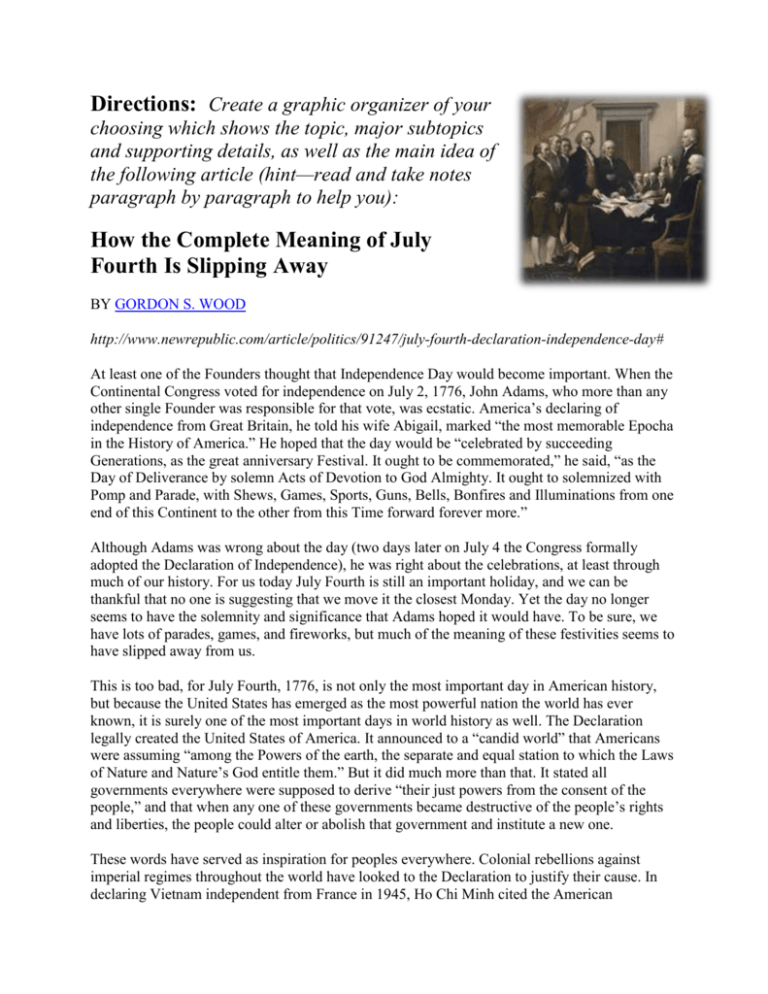
Directions: Create a graphic organizer of your choosing which shows the topic, major subtopics and supporting details, as well as the main idea of the following article (hint—read and take notes paragraph by paragraph to help you): How the Complete Meaning of July Fourth Is Slipping Away BY GORDON S. WOOD http://www.newrepublic.com/article/politics/91247/july-fourth-declaration-independence-day# At least one of the Founders thought that Independence Day would become important. When the Continental Congress voted for independence on July 2, 1776, John Adams, who more than any other single Founder was responsible for that vote, was ecstatic. America’s declaring of independence from Great Britain, he told his wife Abigail, marked “the most memorable Epocha in the History of America.” He hoped that the day would be “celebrated by succeeding Generations, as the great anniversary Festival. It ought to be commemorated,” he said, “as the Day of Deliverance by solemn Acts of Devotion to God Almighty. It ought to solemnized with Pomp and Parade, with Shews, Games, Sports, Guns, Bells, Bonfires and Illuminations from one end of this Continent to the other from this Time forward forever more.” Although Adams was wrong about the day (two days later on July 4 the Congress formally adopted the Declaration of Independence), he was right about the celebrations, at least through much of our history. For us today July Fourth is still an important holiday, and we can be thankful that no one is suggesting that we move it the closest Monday. Yet the day no longer seems to have the solemnity and significance that Adams hoped it would have. To be sure, we have lots of parades, games, and fireworks, but much of the meaning of these festivities seems to have slipped away from us. This is too bad, for July Fourth, 1776, is not only the most important day in American history, but because the United States has emerged as the most powerful nation the world has ever known, it is surely one of the most important days in world history as well. The Declaration legally created the United States of America. It announced to a “candid world” that Americans were assuming “among the Powers of the earth, the separate and equal station to which the Laws of Nature and Nature’s God entitle them.” But it did much more than that. It stated all governments everywhere were supposed to derive “their just powers from the consent of the people,” and that when any one of these governments became destructive of the people’s rights and liberties, the people could alter or abolish that government and institute a new one. These words have served as inspiration for peoples everywhere. Colonial rebellions against imperial regimes throughout the world have looked to the Declaration to justify their cause. In declaring Vietnam independent from France in 1945, Ho Chi Minh cited the American Declaration of Independence. Members of Solidarity in Poland and dissidents in Czechoslovakia invoked its words to oppose Soviet domination in the 1980s. And the Chinese students who occupied Tiananmen Square in 1989 used its language. And maybe there are some participants in the Arab Spring who are aware of our Declaration of Independence. It certainly has become one of the most influential documents in world history. But for Americans the Declaration has a special significance. It infused into our culture most of what we have come to believe and value. Our noblest ideals and highest aspirations—our beliefs in liberty, equality, and individual rights, including the right of every person to pursue happiness—came out of the Declaration of Independence. Consequently, it is not surprising that every reform movement in American history—from the abolitionists of the 1830s, to the feminists at Seneca Falls in 1848, to the civil rights advocates of the 1960s—invoked the words and ideals of the Declaration. It was Abraham Lincoln who made the most of the Declaration, particularly its assertions of human equality and inalienable rights. Thomas Jefferson, the principal drafter of the Declaration, said Lincoln, “had the coolness, forecast, and capacity to introduce into a merely revolutionary document, an abstract truth, applicable to all men and all times, and so to embalm it there, that today, and in all coming days, it shall be a rebuke and stumbling block to the very harbingers of re-appearing tyranny and oppression.” A century later, on the steps of the Lincoln Memorial, Martin Luther King, Jr. took inspiration from this abstract truth embodied in the Declaration. For us Americans, the words of the Declaration have become central to our sense of nationhood. Because the United States is composed of so many immigrants and so many different races and ethnicities, we can never assume our identity as a matter of course. The nation has had to be invented. At the end of the Declaration, the members of the Continental Congress could only “mutually pledge to each other our Lives, our Fortunes, and our sacred Honor.” There was nothing else but themselves that they could dedicate themselves to—no patria, no fatherland, no nation as yet. In comparison with the 235 year-old United States, many states in the world today are new, some of them created within fairly recent past. Yet many of these states, new as they may be, are under-girded by peoples who had a pre-existing sense of their ethnicity, their nationality. In the case of the United States, the process was reversed: We Americans were a state before we were a nation, and much of our history has been an effort to define that nationality. In fact, even today America is not a nation in any traditional meaning of the term. We Americans have had to rely on ideas and ideals in order to hold ourselves together and think of ourselves as a single people. And more than any other single document in American history, the Declaration has embodied these ideas and ideals. Since it is our most sacred text, the day, July 4, 1776, that gave birth to it ought to be understood with all the significance and solemnity that John Adams gave to it. Gordon S. Wood is Alva O. Way University Professor Emeritus at Brown University and the author, most recently, of Empire of Liberty: A History of the Early Republic, 1789-1815.




